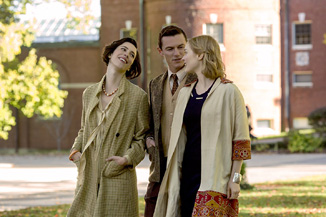The 400-Word Review: Professor Marston and the Wonder Women
By Sean Collier
October 17, 2017
BoxOfficeProphets.com

And, as you may know, he created the character of Wonder Woman. (The timing of this film’s release is not an accident.)
The marketing for Professor Marston and the Wonder Woman would have you believe that this is a movie about the two women in Marston’s life — his wife Elizabeth, played by Rebecca Hall, and their partner Olive Byrne, played by Bella Heathcote — and the profound and lovely influence they had on the iconic character.
Unfortunately, the film is actually much more about Martson (Luke Evans), his fetishes and how they informed the development of the character. It wants to be a movie about a defiant relationship and the feminist icon that relationship produced; in practice, it’s much more a movie about the kinky stuff Marston was into, and how that kinky stuff made Wonder Woman kinky, too.
Is the film’s heart in the right place? Yes, of course. Does it live up to its ambitions? Look no further than the fact that Marston’s name makes the title, while Elizabeth and Olive are sidelined.
Other than serving as the focus of a frame story — Marston must defend his creation to a gruff censor played by Connie Britton — most of the film is more about the evolution of the trio’s relationship than it is about comic books. There are moments of daring emotional complexity in there; there are also many moments of overt sexualization. (We cannot employ the term “male gaze” in its truest form here, since Angela Robinson wrote and directed the film, but it often seems somewhat appropriate.)
To be sure, Professor Marston and the Wonder Women is a great achievement in on-screen representation for polyamorous individuals — and this is a story worth telling. Unfortunately, it also implies that Wonder Woman is a character borne almost entirely as a fetish object. I hope that was accidental; nevertheless, it’s disappointing. Even in her hour of victory, Diana is still under attack.
My Rating: 6/10
Sean Collier is the Associate Editor of Pittsburgh Magazine and a member of the Broadcast Film Critics Association. Read more from Sean at pittsburghmagazine.com/afterdark